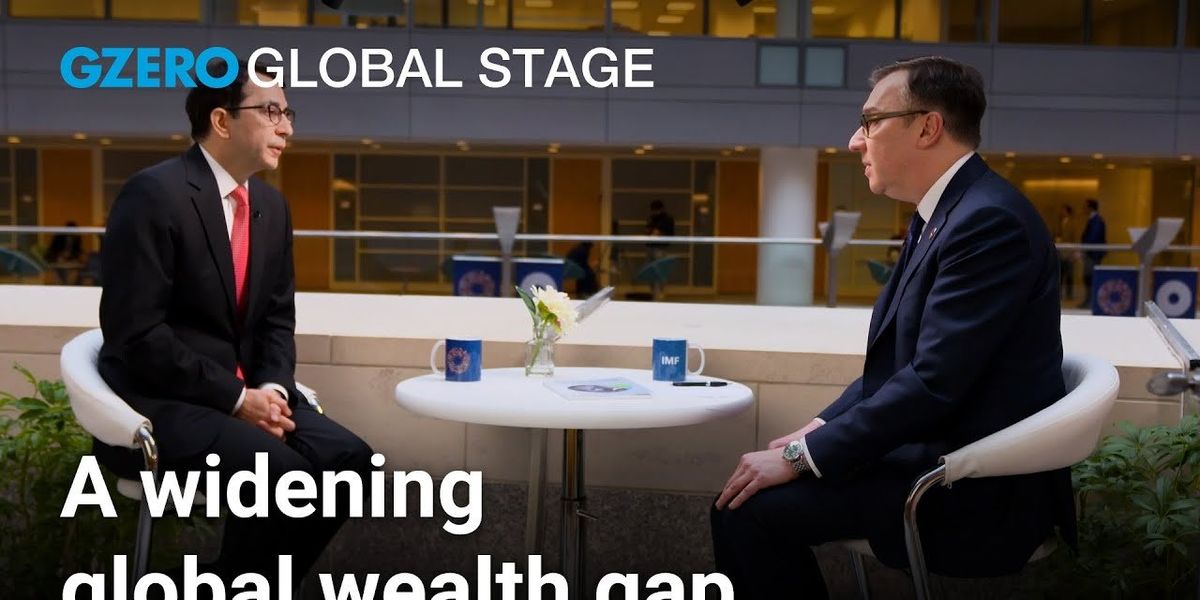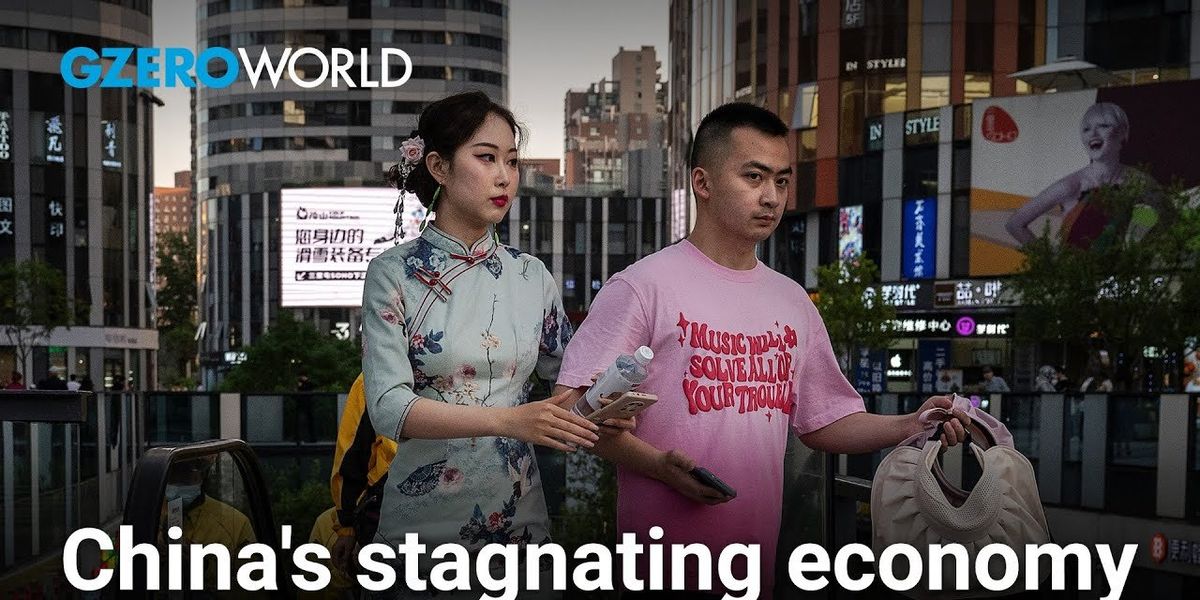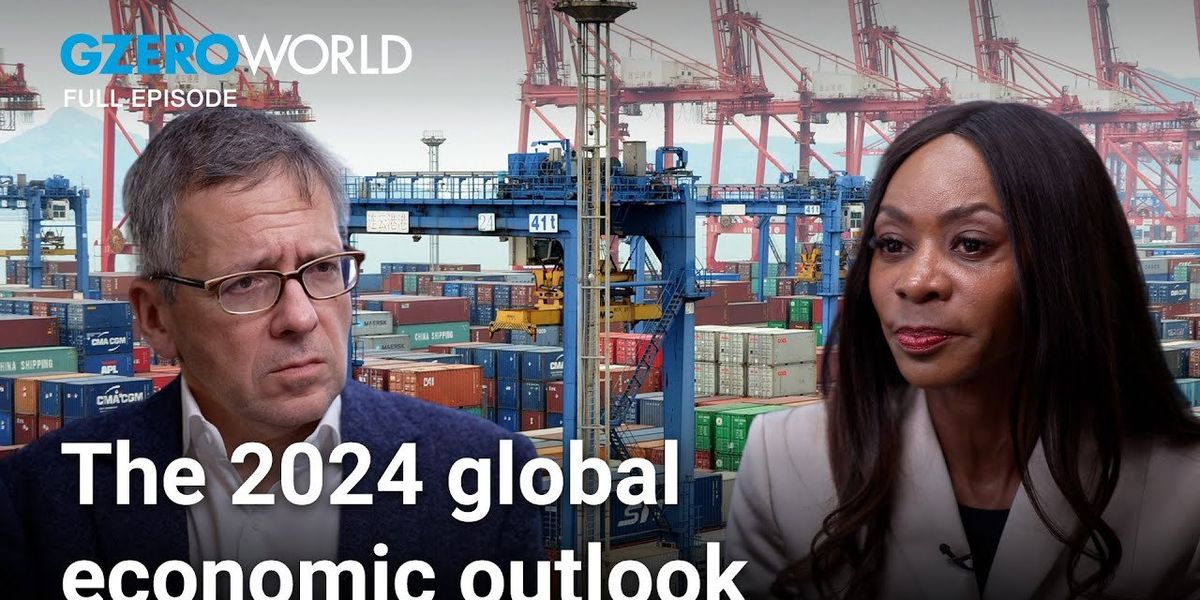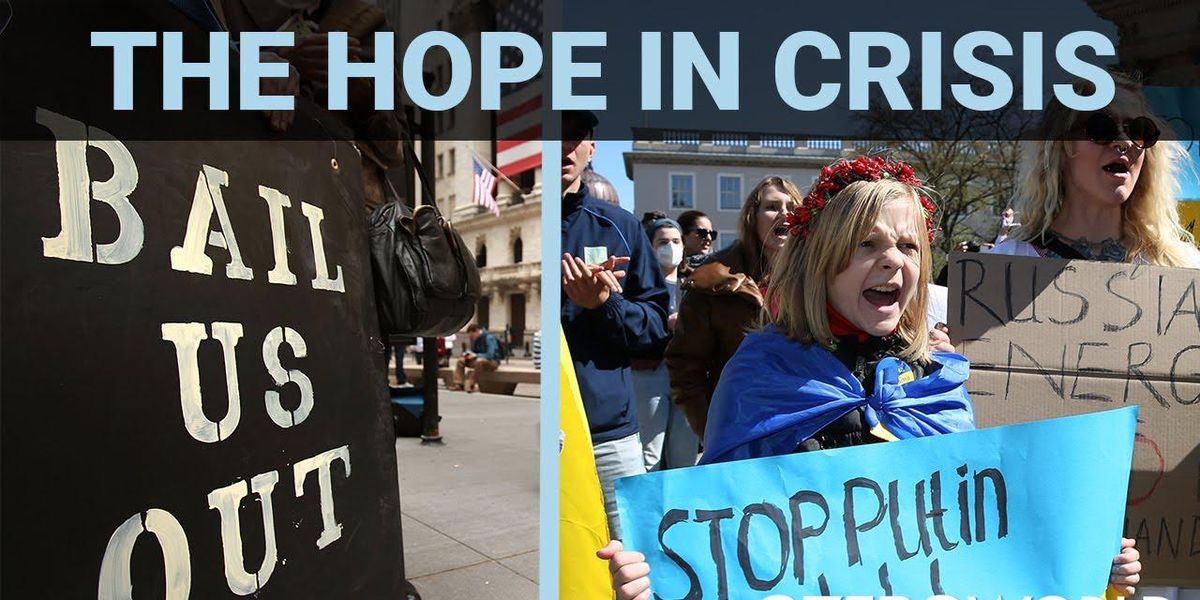Trending Now
We have updated our Privacy Policy and Terms of Use for Eurasia Group and its affiliates, including GZERO Media, to clarify the types of data we collect, how we collect it, how we use data and with whom we share data. By using our website you consent to our Terms and Conditions and Privacy Policy, including the transfer of your personal data to the United States from your country of residence, and our use of cookies described in our Cookie Policy.
{{ subpage.title }}
World Bank economist: The poorest are getting poorer globally
It’s a staggering statistic and a marked setback from the years before the COVID-19 pandemic—the world’s poorest countries are falling further behind, and the wealth gap between the least and most developed nations is growing. One in three of these countries is poorer today than in 2019.
Ayhan Kose, World Bank Group’s Deputy Chief Economist, said that the combined shocks of multiple crises, including the pandemic, wars in Ukraine and the Middle East, food insecurity, and inflation, have taken a massive toll on the 75 least developed economies.
Kose spoke to GZERO’s Tony Maciulis as the annual Spring Meetings of the World Bank and the International Monetary Fund were underway this week in Washington, DC.
“When the food price goes up, the price of oil goes up. That has significant implications for these economies,” he told GZERO. “Where we are now, when you look at 2020-24, they registered the weakest growth rate on average since the 1990s.”
In many ways, the global economic outlook presented this week tells a tale of two post-pandemic realities. Kose explained that the most developed nations, particularly the US, showed greater resilience than expected early in 2023, and the threat of recession has been kept at bay. However, the negative impacts on poor countries, many of which are in Sub-Saharan Africa, cannot be ignored and could lead to greater geopolitical risk and humanitarian emergencies.
This week, World Bank leaders are calling for a renewed commitment to the International Development Association (IDA), which provides zero-interest loans and grants to nations most in need. Kose said the risk associated with crippling sovereign debt has caused some private sector funding to dry up and that politics and protectionism are impacting how wealthier nations approach funding.
But he also pointed to enormous opportunity in nations that are IDA-funded, including a younger population that could serve as a future global workforce and rich natural resources.
With proper investment and funding, he explained, other developing countries have been lifted to find sustained growth.
“At the end of the day history is full of examples. China, India, Indonesia, Chile, (South) Korea. They all used to be IDA borrowers. They were poorer countries. They became much richer.”
For more of our 2024 IMF/World Bank Spring Meetings coverage, visit Glogal Stage.
- What We're Watching: Nigerians vote, Biden's World Bank pick ›
- What We’re Watching: Terror in Kyiv, World Bank/IMF meetings ›
- Podcast: Fix the global debt crisis before it's too late, warns World Bank's David Malpass ›
- Debt limits of rich countries hurt poor countries' growth, says World Bank's Malpass ›
- World Bank's David Malpass on global debt & economic inequality ›
- How to tackle global challenges: The IMF & World Bank blueprint - GZERO Media ›
China's economic slowdown is dragging down the rest of the world
On GZERO World, Ian Bremmer asked economist and author Dambisa Moyo to grade the health of the global economy amid ongoing geopolitical crises and Europe and the Middle East, stalled Covid recovery, and a major economic slowdown in China. Her answer is more optimistic than you might expect, given so much uncertainty and volatility around the world. It’s true that the US economy has shown surprising resiliency, which is why the world avoided a global recession in 2023.
But China’s economic slowdown is still a significant drag on the overall global outlook. Structural issues within the Chinese economy–a collapsing real estate sector, high levels of local government debt, the flight of foreign investment–have a major impact on the world’s finances because of China’s role as the largest foreign direct investor to the developing world, as well many developed economies. But so far, the policy response from the central government has been relatively slow and piecemeal compared to expectations.
Watch the full episode: Is the global economy finally on the right track?
Catch GZERO World with Ian Bremmer every week at gzeromedia.com/gzeroworld or on US public television. Check local listings.
Is the global economy finally on the right track?
How’s the global economy doing… really? When it comes to the world’s post-COVID recovery, it’s a tale of two economies: the United States and everyone else. On GZERO World, Ian Bremmer sits down with economist and author Dambisa Moyo for a hard look at the health of the world’s finances and the impact of geopolitical crises in Europe and the Middle East on trade flows and inflation.
Right now, US indicators are strong, but Germany and the UK are slipping into mild recessions, and China’s collapsing real estate sector, local government debt, and exodus of foreign investment is dragging the world’s second-largest economy into stagnation. Not to mention, Global South countries are holding record amounts of debt. So what does it all mean moving forward? Is the global economy still shaking off its post-Covid hangover or are some of these problems more entrenched?
“We need to be growing at 3% per year in order to double per capita incomes in a generation which is 25 years,” Moyo says, “Most of the global south is growing below that number, materially.”
Ian Bremmer and Dambisa Moyo unpack the confusing state of the global economy, China’s economic woes, and where they see the biggest potential for growth in developing economies during the next decade.
Catch GZERO World with Ian Bremmer every week at gzeromedia.com/gzeroworld or on US public television. Check local listings.
- China’s economy in trouble ›
- Ian Explains: Why China’s era of high growth is over ›
- Struggling for economic progress as global recession looms in 2023 ›
- Dambisa Moyo: Europe's energy transition needs more than a "band-aid solution" ›
- The unintended effect of US-China economic breakup ›
- What saved the global economy from another Great Depression? ›
- Global economy headed to a recession ›
- What geopolitics stories could still blow up the global economy? ›
- Are markets becoming immune to disruptive geopolitics? - GZERO Media ›
- Global economy at risk if Middle East conflict expands, says World Bank's Ayhan Kose - GZERO Media ›
- The gap between Americans' perception of the economy and reality - GZERO Media ›
The global economy: good news and bad news from economist Dambisa Moyo
Listen: In the latest episode of the GZERO World Podcast, Ian Bremmer sits down with economist, author, and member of the UK parliament’s House of Lords Dambisa Moyo for a hard look at the health of the world’s finances, the impact of geopolitical crises in Europe and the Middle East on trade flows and inflation, and how China’s economic woes are impacting everyone else.
Right now, US indicators are strong, but Germany and the UK are slipping into mild recessions, and China’s collapsing real estate sector, local government debt, and exodus of foreign investment is dragging the world’s second-largest economy into stagnation. Not to mention, Global South countries hold record amounts of debt. So what does it all mean moving forward? Is the global economy still shaking off its post-Covid hangover or are some of these problems more entrenched?
Subscribe to the GZERO World Podcast on Apple Podcasts, Spotify, Stitcher, or your preferred podcast platform, to receive new episodes as soon as they're published.
- Ian Explains: How is America's "Pivot to Asia" playing out? ›
- What saved the global economy from another Great Depression? ›
- Global economy headed to a recession ›
- The pandemic’s impact on women and the global economy ›
- What geopolitics stories could still blow up the global economy? ›
- Are markets becoming immune to disruptive geopolitics? - GZERO Media ›
- Global economy at risk if Middle East conflict expands, says World Bank's Ayhan Kose - GZERO Media ›
A man holds wheat grains during harvest in Qaha, El-Kalubia governorate, northeast of Cairo, Egypt.
What We’re Watching: Grain deal deadline, tech layoffs, interest rate ripples
Will the Black Sea grain deal be renewed?
Amid growing concern that Russia may refuse to renew a deal to allow food and fertilizer shipments to travel through a safe passage in the Black Sea, UN Secretary-General António Guterres this week visited Kyiv, where he called for the renewal of the agreement, which is set to lapse on March 18. Quick recap: The grain deal, negotiated by Turkey, the UN, Russia, and Ukraine, was implemented in the summer of 2022 in a bid to free up 20 million tons of grain stuck at Ukrainian ports due to Russia’s blockade. You’ll likely remember that the two states are both huge exporters of wheat, while Russia is also the global fertilizer king. Indeed, the deal has helped alleviate a global food crisis that was hitting import-reliant Africa particularly hard, and driving up global food prices. Kyiv, for its part, says that if the deal is expanded to additional ports it could export at least some of the 30 million tons of grain that remain stuck. The Kremlin hasn’t said what its plans are but this week accused the West of “shamelessly burying" the Black Sea deal in what could be used as a pretext for its refusal to play ball.
For more on what Guterres has to say about the ongoing war in Ukraine and its human toll, check out his interview with Ian Bremmer on GZERO World.
What should we make of the great tech implosion?
We’ve heard a lot about a downturn in the tech sector in recent months after giants including Amazon, Microsoft, Meta, Salesforce, Alphabet, and Spotify laid off large chunks of their workforces. All in all, an estimated 200,000 US tech workers have been shown the door since the start of 2022 – more than the equivalent of the entire Apple workforce. At the same time, however, unemployment in the US remains at record lows, with the US adding more than 311,000 new jobs in February alone, yet another sign of the labor market's resilience. So what does – and doesn’t – the great tech debacle tell us about the current state of the global economy? First, COVID was a boon for the tech sector. As the world shut down, tech companies made the most of increased demand for work/play/eat-from-home services and embarked on massive hiring sprees. Alphabet, for example, increased its workforce by 16% between 2020-2021. But as soon as things reopened, it became clear that consumers wanted to go back to exercising in sweaty gyms and dining at overpriced ramen bars. Demand plummeted. What’s more, rising interest rates – an effort to tackle runaway inflation – and a dizzying stock market are making it harder for tech companies to raise capital and putting downward pressure on stock prices, leading to massive cost-cutting measures. Crucially, analysts warn that things will get worse before they get better.
A mountain of interest rate-driven debt
In the same way that inflation is a global problem, the fix has worldwide ripple effects. Indeed, rising interest rates to tame inflation are making it more expensive to borrow money — as well as pay it back. Last year, a group of 58 developed and emerging economies accounting for over 90% of global GDP surveyed by The Economist were on the hook for a whopping $13 trillion just in interest payments on their debt, up an astounding 25% from 2021. And this is on top of all the additional money that many countries borrowed to spend on stimulus programs during the pandemic. Everyone now owes a lot more than they signed up for at the micro and macro levels: Mortgage rates in the US have skyrocketed, corporate debt has ballooned in Hungary, and highly indebted countries like Ghana are now in even bigger trouble. So long as inflation forces central banks to keep interest rates high, access to capital will be tight for everyone: people looking to finance homes and cars, countries seeking relief from their massive debt burdens, and companies looking to raise money. And as the collapse of Silicon Valley Bank on Friday showed, this kind of risk aversion on the part of investors can — when the stars misalign — threaten to unleash broader financial chaos.Resilience in an era of crisis
We live in an era of emergency. Since 2008, we’ve seen a global financial crisis, a sovereign debt crisis in Europe, and a wave of unrest that sparked political turmoil across North Africa and the Middle East. Civil wars in Syria and Libya helped trigger a migrant crisis that upended European politics. Then came Britain’s exit from the EU, the surprise election of a US president who upended the most basic assumptions about America’s role in the post-war world, and a political crisis in the wake of his defeat. Next came a global pandemic that has killed millions and continues to inflict human, economic, and political damage in every region of the world. Now we have Russia’s war on Ukraine, millions more refugees, and a global food emergency that has only just begun. All of that has happened in the past 14 years.
Given all that, it’s obvious that deeper investment is needed in resilience at every level of government, commerce, and society. In a world of shocks, we need good shock absorbers. Political and business leaders now face a basic choice. They can build networks of trade and political alliances with only like-minded partners – those with similar political systems, cultures, or overlapping interests – to ensure competitors and potential enemies can’t gain strategic advantages by exploiting weaknesses like monopolies on needed resources or supply-chain vulnerabilities. Or they can diversify their partnerships to build relationships where they make the most sense for economic value and the common good. It’s possible that governments will now use sanctions, tariffs, export bans, subsidies, and other forms of protectionism as everyday weapons to build resilience by enhancing security. Others will continue to seek resilience through a broader diversification of their partnerships.
This choice will be most obvious in relations between China and the West. Will the US and EU begin to treat China primarily as a political and economic opportunity or mainly as a security risk? Will China seek a more confrontational role toward the West and the international institutions where it has outsized power, or will it continue to define its security through the dynamism of its global trade and investment relationships?
These are the questions most likely to determine how well the global economy and current international system absorb the next generation of shocks.
Using today's crises to fix tomorrow's problems
We're moving toward more illiberalism, zero trust in the US-China relationship, and other global crises. Are there any reasons for hope?
Not for political scientist and Harvard professor Stephen Walt, who believes we can't tackle all these crises at the same time — otherwise, at some point people will just throw up their hands and say it's just too hard.
What's more, he tells Ian Bremmer on GZERO World, when a crisis hits, the temptation to turn to strongman rule to fix the problem "goes way up."
For her part, Anne-Marie Slaughter, former US State Department official and CEO of New America, thinks we do have the ability to address many of the problems affecting the Global South because the most powerful countries are now all over the world.
Still, she says that many voices of people who need to be at the table — civic groups, CEOs, women, people of color — are not being heard.
Watch the rest of Ian Bremmer's conversation with Anne-Marie Slaughter and Stephen Walt on this episode of GZERO World: Hope as major crises intersect
Ousted Pakistani Prime Minister Imran Khan travels on a vehicle to lead a protest march in Islamabad, Pakistan.
What We're Watching: Imran Khan's threat, a looming global recession, Bolsonaro-Biden meeting
Imran Khan issues dangerous ultimatum
Pakistan’s former Prime Minister Imran Khan – booted from the top job last month by a parliamentary no-confidence vote – has called on the country’s nascent government to hold new elections within six days or risk full-blown social upheaval. For weeks, Khan has been whipping supporters of his Pakistan Tehreek-e-Insaf Party into a frenzy, saying his ouster was perniciously orchestrated by Washington in conjunction with the newly minted PM Shehbaz Sharif. (Khan, of course, fails to acknowledge that his removal was in large part a reflection of dissatisfaction with the country’s imploding economy and dwindling foreign reserves.) Things got really bad this week when Khan led his supporters in a march from his home turf of Khyber Pakhtunkhwa province toward Islamabad. As throngs of angry PTI supporters tried to reach the capital, violent clashes with police ensued in multiple cities. The Supreme Court ordered police to remove barriers on highways that were preventing pro-Khan protesters from reaching Islamabad but said that protests in the capital needed to be confined to a specific area. That didn’t happen, and police responded to the violence and disorder with tear gas. This turmoil comes as Sharif is trying to convince the International Monetary Fund that Pakistan has gotten its act together to get funding back on track. Khan isn’t backing down, and the next week could be deadly.
The national politics of a global slowdown
“As we look at the global GDP... it's hard right now to see how we avoid a recession,” said World Bank President David Malpass on Wednesday. The sources of this potential economic slowdown have everything to do with politics. Vladimir Putin’s decision to order a Russian invasion of Ukraine has had a major impact on world prices for food, fertilizer, and fuel. (Russia and Ukraine are major grain producers, Russia and ally Belarus are leading fertilizer exporters, and Russia is a leading producer of oil and gas.) There’s also China’s political decision to fight COVID with lockdown policies that are sharply slowing growth in the world’s second-largest economy. The result of all this may be an economic slowdown in multiple countries that impacts their politics. Recessions are bad news for incumbents of all stripes, and over the next 18 months, there will be national and/or important state elections in Brazil, the United States, the Czech Republic, Nigeria, Turkey, Italy, Denmark, Malaysia, Pakistan, India, and Germany. We’ll be watching all these countries to see how their political leaders weather potential economic storms.
Bolsonaro to meet Biden, finally
As the Biden administration scrambles to avoid multiple no-shows at next month's Summit of the Americas in Los Angeles, Brazil's President Jair Bolsonaro has reportedly changed his mind and decided to attend ... after President Joe Biden agreed to a bilateral meeting. It'll be the first between him and Bolsonaro, a big fan of Biden's predecessor, Donald Trump, and one of the last world leaders to recognize Biden's 2020 victory. US-Brazil ties are now frosty at best, but the White House is eager to make friends in Latin America as China's influence there grows. Interestingly, Bolsonaro's RSVP coincided with revelations that a top emissary of his presidential election rival and frontrunner Luiz Inácio Lula da Silva dropped by Washington, DC, last month to meet with State Department officials. It's unclear what was discussed, but the Americans are wary of Lula's public support for socialist autocracies in Cuba, Nicaragua, and Venezuela. Lula, for his part, has claimed that the US worked with Brazilian authorities to throw him in jail. Clearly, there's not much love lost between Biden and either Bolsonaro or Lula, so the US will likely avoid picking sides when the two Brazilians face off in October.This comes to you from the Signal newsletter team of GZERO Media. Subscribe for your free daily Signal today.



